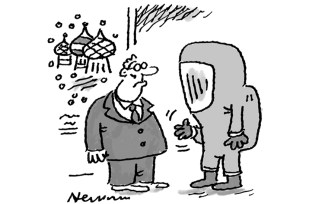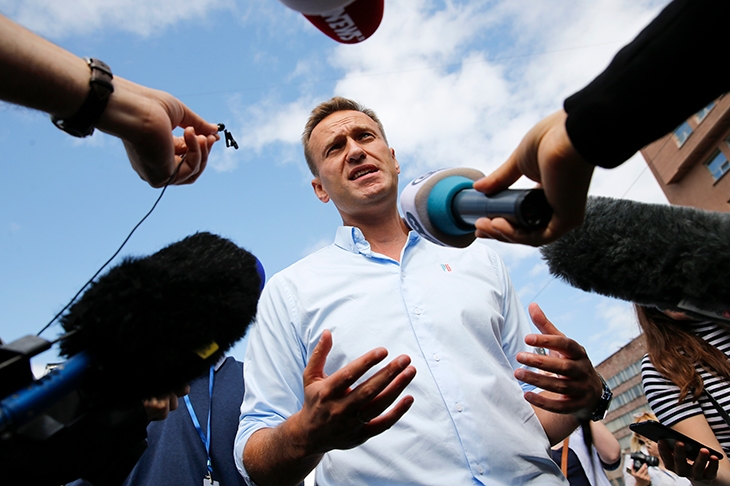His courage is exhilarating. Even if you think his cause hopeless, Alexei Navalny, the Russian opposition leader and Putin-baiter, deserves our admiration. To return to Moscow after being poisoned, surely knowing arrest awaited him, is beyond brave. The chances are he will be crushed. But annihilation is not certain; and if one day he wins his battle with Putin, his return to Moscow this winter will become the stuff of legend. Navalny is not crazy: he has made a rational calculation, weighing the relative safety of a tedious future in grey and indefinite exile against a small possibility of making Russian history. With open eyes he has chosen risk.
That sooner or later Vladimir Putin will be swept away is likely — but when? Might it be sooner? I hear those many media commentators who, after rehearsing with approval the story of Navalny’s return, go on to caution that he hasn’t a chance, and that all the cards are stacked in favour of Putin’s continuing and uninterrupted hegemony. They remind us that the Russian president has the armed forces, the police, the secret service, the economic establishment, the whole hierarchy of power, solidly behind him; and that the ordinary people are for the most part acquiescent. Wise advice, no doubt.

But a word to the wise. Political history is full of big surprises. They are surprises precisely because there was so little warning that they were imminent. It goes as follows. Conventional wisdom says the situation appears stable, and nothing suggests anything big will happen. Something big then happens. Conventional wisdom then opines that it was ‘always inevitable’. When Russia turns against Putin there will be no shortage of pundits saying it had to happen.
Now the point about this is that both the pre-shock and the post-shock wisdoms contain much truth. So much in history, in science, in politics, in human responses and even in meteorology is characterised by periods of stasis or apparent equilibrium, punctuated by sudden big jerks. Scientists have used the term ‘stickiness’ to describe this. Pull a brick on a length of elastic and it won’t move, and still it won’t move — and then it will fly up and hit you. This reflects the laws of friction. Weather systems, too, are sticky: areas of higher and lower pressure are not evened out by gentle breezes — they stick, then break in gales and storms. Beneath the earth’s surface the same holds true, hence earthquakes.
When Russia turns against Putin there will be no shortage of pundits saying it had to happen
Cultural attitudes are sticky like that. In the 1980s when as an MP I was part of a campaign to mitigate legal persecution of homosexuals, we met a blank refusal (across both the Labour and the Conservative parties) even to discuss the issue. ‘Voters would hate this,’ we were told. ‘The Daily Mail would crucify us.’ I remember a kindly Labour whip, the late Walter Harrison, taking me aside privately in around 1986. ‘Leave it alone, lad,’ he said, ‘nothing’s going to move and you’ll only get hurt.’ Between the 1967 Sexual Offences Act and John Major’s lowering the age of consent to 18 in 1994 stretched 27 years of stasis: decades in which opinion leaders were honestly convinced the public would never countenance change. Then — whoosh! — in less time than that, Tony Blair and David Cameron moved from partial decriminalisation to gay marriage, and finally to the categorisation of ‘homophobia’ as a hate crime.
And mostly the public approved, or shrugged. What had been happening during almost three decades of seemingly unyielding popular attitudes? Nothing and everything. Pollsters might have detected only a minor shift in the answers respondents gave — ‘disgusting’, etc — but we’d had John Inman, Kenneth Williams, Round the Horne, Frankie Howerd, Dirk Bogarde, Noël Coward, Liberace, Elton John, Tom Robinson… some of these were in the closet, others not, but most people knew or guessed. And far fewer cared. ‘Times change,’ they said. This, barely perceptible, was the real but more gradual revolution. The Sun’s and parliament’s about-turns were just the catch-up. I expect something similar will happen when assisted dying is legalised.
One more example: the supposed Tory toppling of Labour’s ‘red wall’ constituencies in my part of England in 2019 does look, if you inspect only the bald figures before and after the shock, like a spectacular piece of demolition. But I’ve door-knocked in some of these seats over many years. Demographic change and growing disillusion with Labour had been eating into Labour majorities for a decade at least. Theresa May did well there in 2017. By 2019 lots of them were ready to tip. The political earthquake in that election was a creation of first-past-the-post arithmetic, not a sudden change of the electorate’s heart.
We humans have a conscious mind and a mind of which we are unconscious. But this last is thinking, observing, worrying, re-evaluating and taking stock all the time. In its re-evaluation of a former love or loyalty or trust, it makes no announcements until it has enough evidence. Then it speaks, and we tip. We may appear even to ourselves to have tipped in a matter of weeks from love to hate, from admiration to disapproval, from confidence to distrust — but this will be the conscious product of an unconscious process of far longer duration. Stresses have built slowly. In that way we are like earthquakes, storms or bricks on elastic. We’re sticky. Nothing happens, and nothing happens, and nothing happens; then unexpectedly it all happens at once. The metaphors of ‘something snapped’ or ‘last straw’ or ‘saw the light’ or ‘penny dropped’ are testimony to the stickiness of human judgment. Thus are violent revolutions born.
Do not, then, assess Mr Navalny’s chances on the basis of public quiescence towards Putin, or the apparent monoliths of the apparatus of state, or even the fierce loyalty professed by cronies. Putin may be secure, or he may be on thin ice. We don’t know, and have no more of a window into the collective unconscious of the Russian people than they do themselves.







Comments